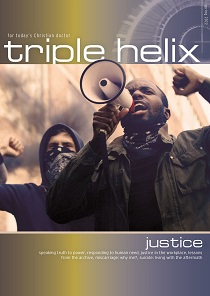Practices function as relatively independent units and lack the external management structure and access to occupational health available in other parts of the health service. Colleagues may work together for many years and know each other well. There are resonances with losing a family member or a member of a church community. Those who have leadership responsibility often know the person who has died as a friend as well as a colleague. They must manage their own feelings and those of everyone else while trying to make sure the practice continues to run.
Essentially it was something I had to get through. It did affect me, but I didn't really have an outlet to discuss it. People just expected me to carry on. [3]
Our experience
On Friday, 23 January 2015, Dr Louise Tebboth, my practice colleague and a CMF member, died by suicide. She was 40 and happily married. Louise had worked with us for twelve years as an associate partner, foundation trainer, and locality safeguarding lead. Many of us were at her wedding. She had suffered from depression before but had been well for several years when another episode hit. After a couple of months off, she had been preparing to return to the job she loved. [4]
Our experience is not unique. In 2020, Professor Gail Kinman [5] and I interviewed others working in general practice who had lost a colleague, not always a doctor, by suicide. We found common themes but no easy answers. [6]
The death of any colleague can be devastating. When the cause is suicide, the torrent of emotions can be overwhelming. [7]
I will not forget the Saturday morning phone call from Gary, Louise's husband. At least there were five of us to sit in stunned silence for half an hour before trying to plan. [8]
We had to think about so many things. The staff needed to know before they came in on Monday. We divided the calls. There would be strong emotional reactions. There was a gathering of all staff early on the Monday, and again at lunchtime. We had to decide how to tell the patients. The staff suggested a pause for 24 hours before the news was made public. That gave time to prepare posters and place flowers and memorial books for messages in the reception areas. It was our reception team who had to handle much of the distress.
Still the patients kept coming. We had to work to meet their needs while trying to cope with our own feelings and those of our colleagues.
It was hard enough for us working in a largish practice. An east London GP, Dr Farzana Hussain, describes being left to run her practice single-handed while struggling with her own grief when her partner died by suicide.
The next day my practice manager had managed to get a locum in. But there were all the prescriptions to do. I think it took me an hour to do ten prescriptions in between tears. [9]
No one should find themselves struggling unsupported as she did.
What should we tell the patients?
There are more questions than answers. There may be uncertainty about the cause of death, or the family may not wish it to be known. Our staff knew that Louise had died by suicide, but we did not share this with patients for some time. When fundraising in aid of cancer was proposed, we started to give the information when asked. Although most patients took the news calmly, some did not. Finding the words was hard.
We had to talk through somebody talking through the trauma of them losing our colleague. We never got to say 'You know what? This is painful for me too. [10]
The funeral and remembering
Not being allowed to close for the funeral (to which we were invited) is a common experience and is extremely difficult for those who must stay at work. Practices can close for learning events. Why are they not supported in closing for a staff member's funeral? Sometimes too much is expected of us by others and by ourselves.
All of us felt like somebody else's right to grief was greater than our own. [11]
It was helpful for us to hold a later memorial event to which we invited family, staff, and patients. [12] We also created a video celebrating our memories of Louise. [13]
Doctors are expected to be empathic towards their patients, even when their own emotional reserve is empty. We cannot continue to ignore deep distress in doctors and give our colleagues less care than we expect them to give patients. We must care before it is too late. [14]
Responsibility and guilt
Do not judge and you will not be judged; do not condemn and you will not be condemned. Forgive, and you will be forgiven. (Luke 6:37 NRSV)
Feelings are inevitably strong. People blame themselves and others. False assumptions are made. Members of the team can displace anger or distress on to other issues without recognizing what is happening. If the person who died was the subject of a complaint, a known risk factor, feelings may be even more complex. [15] We need compassion for each other and compassion and support from those around us, including those who regulate us. [16] Individuals and the practice can remain fragile for a long time.
Learning from loss
...neither death, nor life, nor angels, not rulers, nor things present, nor things to come, nor powers, nor height, nor depth, nor anything else in all creation will be able to separate us from the love of God in Christ Jesus our Lord. (Romans 8:38-39 NRSV)
Judas Iscariot, repenting of his betrayal, tried to return the thirty pieces of silver he was paid to the chief priests and elders. Their response was, 'what is that to us? See to it yourself.' He flung the money on the temple floor and went out and hanged himself. [17] If one of the elders had spoken to him wisely and kindly, might the outcome have been different?
When Lizzie Lowe, a Manchester teenager, died by suicide in 2015 aged 14, her church 'crumpled' as they came together in grief. Only at her inquest three months later did they discover she had been unable to reconcile being a Christian and gay. [18] As her minister said, 'this must never happen to another teenager, anybody, ever again'. The church went on to challenge its own 'conspiracy of silence' around the issue of sexuality. [19], [20]
Depression is a potentially fatal illness, and Louise was ill. Sadly, she successfully hid her delusional conviction that she was programmed to die by suicide and that her family would be better off without her. [21] It is our hope that even in that darkest hour, she somehow knew the love of Christ. [22], [23], [24]
What else would help?
Even though I walk through the darkest valley, I fear no evil; for you are with me; your rod and staff - they comfort me. (Psalm 23:4 NRSV)
In the aftermath of a sudden death, practices need time to talk, time to work out how to respond, time to remember. We need compassion for each other and compassion and support from those around us, including those who regulate us. [25] Those of us who are Christians need time to pray together, to know that God is with us, and perhaps to reflect on a verse that was important to Louise. 'Be still and know that I am God'. (Psalm 46:10) [26]
We needed someone to be alongside us over a fairly long period, to listen to us, to help us to explore our complicated feelings, to talk about our colleague and the fear that we had failed her. We needed someone not immediately involved in running the practice to provide pastoral and spiritual care for patients and staff, whatever their faith. A local church may support individuals but may not be able to work with a whole practice as they grieve together. Perhaps what every practice needs is a chaplain. [27]
Rebecca Torry worked as a GP in South London for 36 years, retiring in December 2020.
































